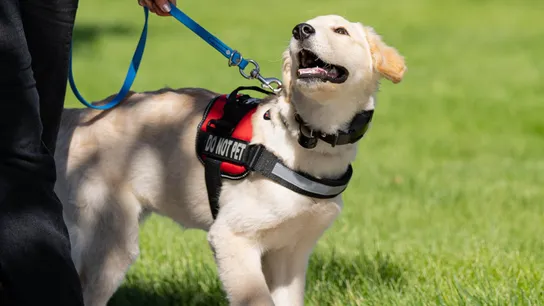What if you could turn your anxiety into companionship and support? For those living with PTSD, the gradual path to recovery often includes the unconditional love and loyalty of service dogs. Understanding how these dogs are trained and the profound impact they have can make a world of difference—not just for the individuals they assist, but for the entire community.

This image is property of images.1851franchise.com.
The Vital Role of Service Dogs in PTSD Recovery
Service dogs have played an important role in helping individuals overcome the challenges of living with post-traumatic stress disorder (PTSD). These specially trained animals provide more than just companionship; they serve as lifelines, offering emotional support and helping individuals navigate the complexities of their daily lives.
What is PTSD?
Understanding PTSD is crucial in recognizing the need for support systems. Post-traumatic stress disorder can occur after experiencing or witnessing a traumatic event. Symptoms may include flashbacks, severe anxiety, nightmares, and emotional instability. Often, those with PTSD feel isolated, as their inner battles can be difficult to communicate to others.
How Service Dogs Help
Service dogs are trained to assist individuals with various tasks that can help mitigate the challenges posed by PTSD. Their training equips them to recognize signs of distress and provide comfort through physical presence and specific actions. Here’s how they can assist:
| Function | Description |
|---|---|
| Calming Presence | Simply being there can reduce feelings of anxiety and loneliness. |
| Anchoring | Dogs can help ground their owners during moments of distress, providing a sense of stability. |
| Distraction | Engaging with a dog can divert attention away from negative thoughts and feelings. |
| Alerting | Some dogs are trained to sense anxiety attacks or triggers, notifying their owners in advance. |
| Mobility Assistance | For those who may struggle with physical anxiety manifestations, service dogs can offer support on a practical level. |
Dog Training Elite Northeast Houston: A Beacon of Support
Rachel and Daniel Van De Mark, the owners of Dog Training Elite Northeast Houston, play a pivotal role in supporting those who are recovering from PTSD through the use of service dogs. They not only train these four-legged helpers, but they also work diligently to raise awareness about the transformative impact of these animals.
Graduation Ceremonies: Celebrating Progress
In acknowledgment of PTSD Awareness Month, the Van De Marks organized a service dog graduation ceremony to honor those dogs that have completed their training. This event is more than just a celebration of skill; it represents the hope and healing that service dogs can bring to individuals grappling with PTSD.
Community Engagement
The Dog Training Elite Northeast Houston team is dedicated to involving the community in their mission. They frequently host workshops, educational events, and community gatherings to spread awareness about PTSD and the vital role service dogs can play in recovery. By creating these opportunities, they foster a sense of understanding and support that can extend far beyond individual cases of PTSD.

This image is property of images.1851franchise.com.
Understanding Service Dog Training
One of the most common questions from those curious about service dogs is how they are trained. Training a service dog involves specialized techniques to ensure that the animal can perform its duties effectively and humanely.
The Basics of Service Dog Training
Training service dogs typically follows several stages, which can include:
- Basic Obedience Training: Teaching the dog essential commands like sit, stay, and come.
- Task-Specific Training: Depending on the needs of the individual, dogs may be trained to perform specific tasks, such as retrieving medication or interrupting anxiety episodes.
- Public Access Training: This involves acclimating the dog to various environments to ensure they can behave appropriately in public without becoming distracted or overly reactive.
- Bonding Sessions: Building a strong connection between the dog and the person it will assist is crucial for effective support.
Ongoing Support and Adjustment
It’s important to note that the training does not end once a dog graduates. Continuous support and adaptation to the individual’s evolving needs play essential roles in the relationship between a person and their service dog.
Benefits of Service Dogs for PTSD Recovery
Engaging with a service dog during your recovery from PTSD presents multiple advantages. Here are some of the key benefits:
Emotional Support
The unconditional love and companionship of a service dog can help reduce feelings of loneliness and isolation. This emotional support often proves vital for individuals battling PTSD.
Increased Independence
Service dogs often enable their handlers to regain confidence and independence by allowing them to cope better with symptoms. Whether it’s providing physical support or increasing safety, these dogs empower individuals to live more fulfilling lives.
Enhancement of Social Interactions
Having a service dog can act as a social bridge, enabling interactions with others. People may feel more comfortable approaching you when you are with your dog, providing an opportunity for building new connections.
Stress Reduction
The presence of a dog can lower stress levels and promote a sense of calm. Engaging with a service dog—petting, playing, or simply sitting together—can stimulate the release of serotonin and oxytocin, chemicals in the brain that promote happiness and relaxation.
Routine and Structure
For many individuals with PTSD, having a structured daily routine can be incredibly helpful. Service dogs require regular feeding, walks, and care, encouraging their owners to establish routines that can restore some stability in their lives.

This image is property of images.1851franchise.com.
Debunking Myths About Service Dogs
Misconceptions about service dogs can sometimes lead to misunderstandings. Here is a breakdown of common myths:
Myth 1: All Dogs Can Be Service Dogs
Not every dog is suited for service work. Specific breeds often possess the temperament and traits needed to be effective service dogs, along with rigorous training that not all dogs are capable of completing.
Myth 2: Service Dogs are Only for Physical Disabilities
While service dogs are well known for assisting individuals with physical disabilities, their roles in aiding those with PTSD and other mental health conditions are just as significant and impactful.
Myth 3: Service Dogs Should Always Be Petted
It’s important to remember that when a service dog is working, they should not be distracted. Respecting their role and allowing them to focus on their tasks is essential to ensure they can perform their functions effectively.
Myth 4: Service Dogs are Costly and Unreachable
While obtaining a service dog can involve significant costs, organizations like Dog Training Elite and various non-profits offer training programs that can help offset expenses or offer support in securing a service dog.
Getting Involved: Supporting PTSD Recovery Through Service Dogs
If you are inspired by the work being done to promote awareness of PTSD and service dogs, consider how you might get involved. There are many ways to support these efforts:
Volunteer Opportunities
Local service dog organizations, like Dog Training Elite Northeast Houston, often seek volunteers. Whether you are interested in helping with training, hosting community events, or providing administrative support, your involvement can make a real difference.
Fundraising Activities
Consider hosting or participating in fundraising activities to support service dog training programs. Initiatives like charity walks, bake sales, or local events focused on raising awareness can drive funding towards much-needed training resources for those in need.
Education and Advocacy
Spreading awareness about PTSD and the benefits of service dogs can help destigmatize mental health challenges. Share information through social media, schools, or community organizations to foster understanding and support.
Become a Mentor
If you have experience with service dogs or PTSD, consider mentoring individuals who are navigating their journeys. Your first-hand knowledge and encouragement can provide invaluable insights to someone in need.

This image is property of 1851-prod.s3.amazonaws.com.
Conclusion: The Path to Recovery with Service Dogs
As you reflect on the importance of service dogs in the lives of individuals dealing with PTSD, it’s clear that their influence is profound and far-reaching. Whether it’s through the training offered by dedicated organizations or the community outreach led by figures like Rachel and Daniel Van De Mark, the efforts to support those in recovery are critical.
Service dogs are more than just companions—they are partners in healing, helping individuals reclaim their lives one day at a time. If you or someone you know is struggling with PTSD, consider the possibility of incorporating a service dog into the recovery journey. With the right support, the road to recovery can lead to brighter days ahead.
